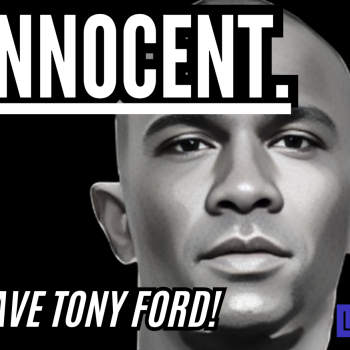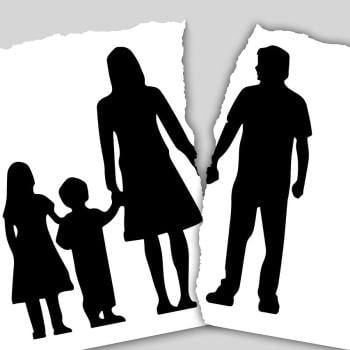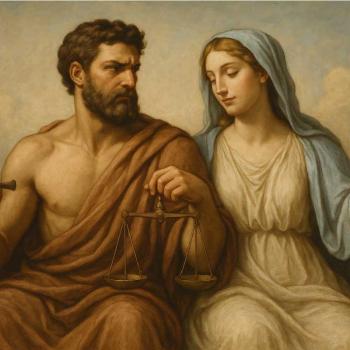My own spiritual ancestor, Divus Hadrianus, better known to history as the Roman Emperor Hadrian, had a remarkably tolerant attitude to Christians in those early centuries of the movement. He enacted a law which stated that no one could denounce someone as a Christian just for being a Christian, but instead that the Christian concerned had to be committing some illegal and punishable offense; and if they were committing such an offense, they should be punished for it, not for being a Christian. This legal action of his was so appreciated by the Christians that they preserved it in their own historical records and chronicles. Where Christianity was concerned, Hadrian's approach was a forerunner to "don't ask, don't tell," in many respects (in the memorable formulation of Steven Saylor's novel Empire)!
However, Hadrian was far from perfect, and likewise neither were many of his spiritual descendants. The holy city of Antinoöpolis, founded on the spot where the god Antinous died and was deified, had Christians living in it before the time of Constantine, and many were executed when they ran afoul of the authorities. I take this fact rather personally, and while I am not myself responsible for those deaths or those actions, I feel it should be my responsibility to make sure such atrocities never happen again. This is one of the motivations for the ritual we've held in the Ekklesía Antínoou on a few occasions already, and which I hope we'll hold on more occasions in the future, known as the Communalia. In this, we make a public acknowledgment of the difficulties of the past between different religions and cultures, and vow to not repeat such atrocities in the future, and in fact to be allies to one another in the event that our communities come under threat for whatever reason. I'd like for Jews, Christians, and Muslims to take part in this ritual with us at some point in the future—but, every time I've invited them to do so, they have not even given a polite refusal, but instead have entirely ignored my request. So much for "loving thy neighbor," or much less "loving thy enemy," I suppose, at least on the part of the religious people who have that teaching in their sacred scriptures....
All of the Christian scriptures were written during the period of persecution before Constantine, and even though their final redaction was not compiled until this period "officially" ended with the principate of Constantine, up until then the religion had largely been an ascetic one with little investment in "this world," since Jesus had said that the end of the world would arrive in the lifetime of those hearing him. The scriptures of the religion—particularly the Gospel of Mark—were a guidebook in preparation for martyrdom: death at the hands of the Romans had been Jesus' fate, and it would be a glorious, blessed, and fitting result for anyone who wished to be his follower as well. (And Saul of Tarsus' writings on being "baptized into Jesus' death" and so forth didn't help the situation at all!)
When, rather suddenly, the Christians found themselves in the position of power, they quickly forgot many of the teachings on meekness and non-violence of their ostensible founding figure, and instead carried out a persecution of non-Christian culture and religion that left almost nothing standing, quite literally (with the exception of some of the nicer buildings that could be re-used as churches—including the Pantheon built by the Emperor Hadrian to honor all the gods). They could not even extend the level of tolerance to people who weren't of their religion that Hadrian had extended to them, and for which they praised and admired him.
And, because the Christian scriptures haven't changed, and their overall message hasn't changed, since those times, Christian ideals and teachings still prepare everyone for potential martyrdom, and put Christians in a constant position of feeling persecuted in the world, even when all that is occurring is the speaking of an alternative viewpoint to their own—whether those alternate ideas are spiritual or secular. And, for this, our spiritual ancestors as Pagans and polytheists bear some responsibility.
For my part, I'd like to offer the following to any Christians who might be reading this: I'm very sorry that the basic misunderstanding between your ancestors' beliefs and my ancestors' practices lead to you becoming what you have since then. It was wrong for my spiritual ancestors to persecute your spiritual ancestors in the way that they did. I also think it would be wrong to say, "But it was all for the good, because look how things ended up"; no, "how things ended up" has been even worse than the initial situation.
So, for the part that my spiritual ancestors played in the creation of your current state of feeling like a persecuted minority—even despite the fact that there are more of you alive now than there were of all my spiritual ancestors combined in the four centuries between when your religion emerged and when it came into absolute political power - I am truly and deeply sorry.





